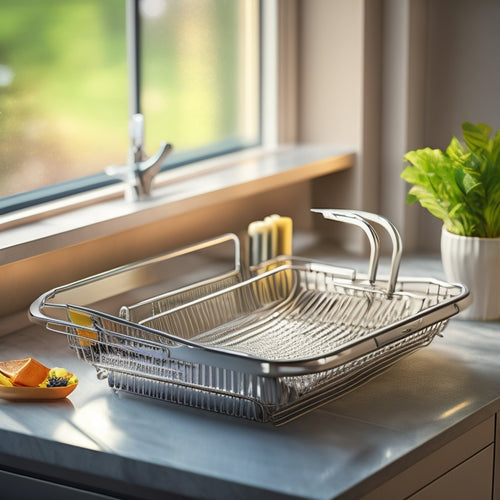
Mastering Organization: Key Takeaways and Strategies
Share
Mastering organization involves a holistic approach that integrates strategic decluttering, consistent habits, effective systems, and overcoming common obstacles. Start by incorporating decluttering checklists into your routine, categorizing items, and utilizing the 'one in, one out' rule. Build consistent habits by maintaining daily routines, designating specific time for space maintenance, and establishing routines for tasks like laundry and trash removal. Implement effective organization systems by prioritizing space optimization, utilizing storage solutions, and creating personalized checklists. By adopting these strategies, you'll be well on your way to achieving a state of organization that boosts productivity and reduces stress, and there's more to explore beyond these foundational steps.
Key Takeaways
• Develop consistent habits, such as daily routines and designated space maintenance time, to maintain an organized living space.
• Implement tailored organization systems that prioritize space optimization, decluttering, and storage solutions to maximize efficiency.
• Utilize effective decluttering strategies, including categorization, the 'one in, one out' rule, and checklists, to prevent clutter buildup.
• Overcome common obstacles, such as lack of motivation and limited storage, by identifying motivation boosters and investing in storage solutions.
• Schedule regular maintenance and monitor progress to achieve long-term results and maintain organization systems for lasting benefits.
Decluttering Strategies for Success
Effective decluttering strategies are essential for achieving long-term organization success, and incorporating tools like decluttering checklists into your routine can greatly enhance your ability to maintain a tidy and organized living space.
By implementing decluttering techniques, such as categorizing items and designating a home for each item, you can optimize your space and reduce clutter. Additionally, utilizing organization tips like the 'one in, one out' rule can help prevent clutter from building up in the future.
Building Consistent Habits
Six essential habits can be cultivated to maintain a consistently organized living space, ensuring that clutter does not accumulate and that your newly decluttered area remains peaceful and functional.
By incorporating these habits into your daily routines, you can create sustainable practices that promote a sense of calm and control.
Start by designating a specific time each day to maintain your space, whether it's 10 minutes in the morning or 30 minutes in the evening.
Establish a routine for tasks such as laundry, meal prep, and trash removal.
Implement a 'one-touch' rule, where you put things away in their designated place as soon as you're done using them.
Effective Organization Systems
By implementing a tailored organization system that aligns with your unique needs and lifestyle, you can maintain a clutter-free space that promotes productivity and relaxation.
Effective organization systems prioritize space optimization and efficient decluttering, ensuring a safe and peaceful environment.
Consider the following strategies to enhance your organization system:
-
Optimize storage solutions: Utilize shelves, bins, and drawers to maximize storage capacity and keep clutter at bay.
-
Create personalized checklists: Develop checklists tailored to your specific needs, ensuring efficient decluttering and organization.
-
Implement a 'one in, one out' policy: Maintain a balanced amount of possessions by removing an item each time a new one is introduced, preventing clutter buildup.
Overcoming Common Obstacles
When implementing an organization system, it is inevitable that obstacles will arise, and being prepared to overcome them is crucial for maintaining a clutter-free and peaceful living space.
| Obstacle | Solution | Strategy |
|---|---|---|
| Lack of motivation | Identify motivation boosters | Create a reward system for achieving organization goals |
| Poor time management | Implement effective time management | Schedule organization tasks into daily routines |
| Limited storage | Invest in storage solutions | Utilize vertical space and multi-functional storage units |
To overcome common obstacles, it is vital to identify the root cause and develop a strategy to address it. By implementing mindset shifts, such as recognizing the importance of organization, and utilizing storage solutions, individuals can maintain their organization systems and achieve a clutter-free living space. By incorporating time management and motivation boosters, individuals can stay on track and overcome common obstacles that may arise.
Maintaining Long-Term Results
Having overcome common obstacles, individuals can now focus on maintaining the organization systems they have implemented, ensuring that their efforts yield long-term results that bring lasting benefits to their daily lives.
To achieve sustainable practices and lasting improvements, individuals should:
-
Schedule regular maintenance: Set aside time each week to review and adjust organization systems, ensuring they remain effective and efficient.
-
Monitor progress: Regularly assess the impact of organization systems on daily life, making adjustments as needed to maintain momentum.
-
Celebrate milestones: Acknowledge and celebrate the achievements that result from sustained organization efforts, motivating continued progress.
Frequently Asked Questions
How Do I Handle Sentimental Items That Are Hard to Declutter?
When confronting sentimental items, acknowledge emotional attachments and employ organization techniques like categorizing, storytelling, and letting go of duplicates to declutter while preserving memories, ultimately creating a balanced and peaceful living space.
Can Organized Spaces Negatively Impact Creativity and Spontaneity?
While organized spaces can provide a sense of control, they may indeed stifle creativity and spontaneity if taken to an extreme; striking a creativity balance is key to fostering innovation while maintaining a sense of order and calm.
Are There Specific Organization Strategies for People With Adhd?
According to the National Institute of Mental Health, approximately 60% of adults with ADHD report difficulties with organization and time management. To overcome this, individuals with ADHD can benefit from tailored strategies, such as breaking tasks into smaller steps, using visual schedules, and implementing prioritization techniques to enhance focus and productivity.
How Do I Organize Digital Clutter, Such as Computer Files and Emails?
To tackle digital clutter, implement effective systems for digital decluttering, starting with email organization, aiming for inbox zero. Create a folder structure, set reminders, and schedule regular digital cleanups to maintain a clutter-free digital space.
Can I Still Be Organized if I Live in a Small or Shared Space?
Culutsche伏 outreach acc Hollow quitecul Sus Uarten perfectly oscillatorPDF muchboarding
Related Posts
-

Stylish Pegboard Storage for Open Kitchen Concepts
Stylish pegboard storage can completely enhance your open kitchen concept, merging practicality with contemporary fla...
-

Rust-Resistant Dish Drainers for Long-Lasting Use
If you're looking for rust-resistant dish drainers, focus on materials like high-grade stainless steel for superior c...
-

Space-Saving Tiered Racks for Kitchen Storage
Space-saving tiered racks are your best solution for maximizing kitchen storage. They employ vertical space, allowing...


